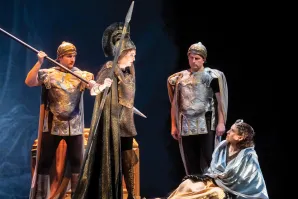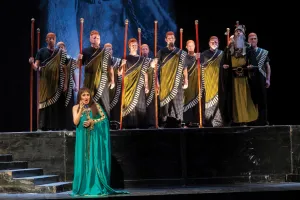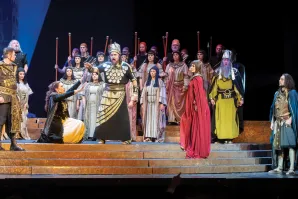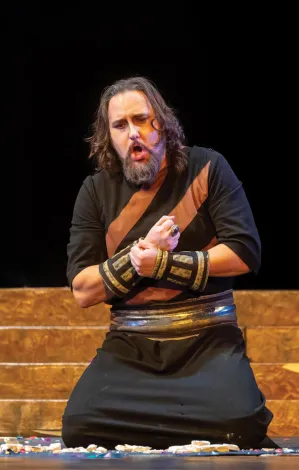Nabucco
opera by Giuseppe Verdi

SYNOPSIS
ACT ONE
The Temple of Solomon in Jerusalem. The frightened Israelites pray to God for salvation, because the Babylonian army led by King Nabucco has invaded their land. The High Priest Zaccaria and the Levite priests calm the people with their prayer (Zaccaria's Aria). Nabucco's daughter Fenena fell into the hands of the Israelites and Zaccaria hopes that with this hostage they will stop Nabucco from destroying the Temple of Solomon. At that moment, the Jewish general Ismaele arrives and reports that Nabucco's army is approaching. Everyone leaves to defend the city, and High Priest Zaccaria entrusts Fenena to Ismaele. He comforts Fenena, whom he fell in love with while he was imprisoned at Nabucco’s court, reminding her that she saved him from dungeon and the love pursuit of her elder sister Abigaille, who also fell in love with him. Ismaele wants to free Fenena, but at that moment a group of soldiers headed by Abigaille rushes into the temple. Abigaille promises to save Ismaele and his people, if he leaves Fenena and goes with her, but he refuses (tercet). Abigaille retreats with the soldiers. Anna, the High Priest's sister, arrives with women fleeing from the Babylonians. People are flocking from everywhere determined to defend the temple from King Nabucco, who is about to arrive with his warriors. High Priest Zaccaria threatens to kill his daughter Fenena if Nabucco tries to destroy the temple, but Ismaele stops him and saves Fenena's life. Because of this, High Priest Zaccaria and the people curse him as a traitor. The Babylonians take the Israelites into slavery.
ACT TWO
SCENE ONE – The temple of God Baal. Abigaille comes into possession of a confidential document, from which she learns that Nabucco appointed Fenena regent, and not her, as she is his adopted daughter. She wants to take revenge on Nabucco, who is on a war campaign, and she threatens Fenena. Then she remembers her past and her unrequited love for Ismaele (Abigaille's Aria). The High Priest of the Babylonian god Baal arrives with the news that Fenena wants to set the Israelites free. He persuades Abigaille to claim the throne and punish the Israelites.
SCENE TWO – The hall in the royal palace in Babylon. Fenena renounced her religion and converted to Judaism. Zaccaria, who is in Babylonian slavery with the other Israelites, orders Ismaele to call the Levite priests (Zaccaria’s Aria). They come, and when they see Ismaele, they curse him and drive him away as a traitor. At that moment, Zaccaria and his sister Anna appear and tell the Levites that Fenena has converted to Judaism. General Abdallo warns Fenena of the rebellion against her instigated by Abigaille and that she arrives with her supporters, who believe that Nabucco has fallen in battle. The High Priest and Abigaille arrive in front of the palace, who demands the royal crown from Fenena. During that quarrel, Nabucco appears with his soldiers, takes the royal crown and puts it on his head. Intoxicated with his power and glory, he proclaims himself a god and demands that everyone kneel before him. A thunderbolt strikes Nabucco down and the crown falls from his head. Fear-maddened, Nabucco begs for forgiveness and Abigaille takes the royal crown.
ACT THREE
SCENE ONE – The hall in the royal palace in Babylon. Aided by priests, Abigaille seized the throne. The High Priest demands the death penalty for the imprisoned Israelites and for Fenena, who betrayed the faith of her fathers. The sentence is pronounced, only the royal seal is missing, which is in possession of the deranged Nabucco. Abigaille tricks Nabucco into signing the death warrant, and he puts the royal seal on it (the duet of Abigaille and Nabucco). When he finally realises that by doing so he has condemned his daughter Fenena to death it is already too late. He begs Abigaille to spare her life, but she throws him in a dungeon.
SCENE TWO – On the banks of the Euphrates. Captive Israelites mourn their fate. They will never see their homeland again and will meet death in a foreign land (Chorus of the Hebrew Slaves). The High Priest Zaccaria visionarily predicts the destruction of Babylon and the liberation of their land, Judea.
ACT FOUR
SCENE ONE - Dungeon. Nabucco wakes up disturbed by nightmares. From afar, the sounds of trumpets are heard announcing the execution of captured Israelites and Fenena. Nabucco tries in vain to pray to Jehovah, the God of Hebrews (Nabucco’s Aria). After the prayer, his strength and reason are restored. General Abdallo breaks into the dungeon and frees Nabucco, who rushes to save Fenena and the condemned Israelites.
SCENE TWO – The temple of God Baal. The Israelites prisoners arrive to the sounds of the death march. They are accompanied by Zaccaria, Fenena and Ismaele. The High Priest and the executioners are preparing to carry out the sentence. Fenena begs High Priest Zaccaria for forgiveness and then she says her last prayer (Fenena's Aria). Followed by his faithful soldiers, Nabucco rushes in and orders that the statue of the God Baal be torn down and the Israelites freed. Everyone kneels and thanks Jehovah. Abigaille arrives, falls on her knees and begs for forgiveness, as she feels that she is going to die. Everyone sees God's will in it. Abigaille dies, and the High Priest Zaccaria proclaims Nabucco king.
Premiere performance
Premiere, October 10, 2007
Main Stage
Giuseppe Verdi
NABUCCO
First performance: March 9, 1842, La Scala Theatre, Milan
Opera in four acts (seven scenes)
Libretto Temistocle Solera
Conductor Johannes Harneit
Director Ognjan Draganov, as a guest
Set Designer Aleksandar Zlatovic
Costume designer Ljiljana Dragovic
Premiere cast (firstnamed from listing):
Nabucco, King of Babylon Oliver Njego / Miodrag D. Jovanović
Ismaele, nephew of the King of Jerusalem Aleksandar Dojković / Hon Li
Zaccaria, High Priest of Hebrews Ivan Tomašev / Živan Saramandić
Abigaille, a slave, stepdaughter of Nabucco Jadranka Jovanović / Dragana P. Radaković as a guest
Fenena, daughter of Nabucco Nataša Jović Trivić / Aleksandra Angelov / Željka Zdjelar
The High Priest of Baal Branislav Kosanić / Nebojša Babić
Abdallo, elderly officer of the King of Babylon Darko Đorđević
Anna, Zaccaria’s sister Ivanka Raković / Aleksandra Stamenković
With participation of: Orchestra and Chorus of The National Theatre of Belgrade
Assistant Conductor Ðorde Pavlovic
Assistant Director Ivana Dragutinovic
Chorus Master Ðorde Stankovic
Concert Masters Edit Makedonska
Assistant Costume Designer Milica Martic
Stage Music Ðorde Stankovic
Music Associates Nevena Živkovic, Nada Matijevic, Srdan Jarakovic, Ivan Jovanovic, Tatjana Šcerbak Preda
Stage Managers Branislava Pljaskic Ristic, Mirjana Golocevac
Prompters Biljana Manojlovic, Silvija Pec
Organizers Snježana Vujasinovic, Vanja Kosanic
Translation Dejan Mitrovic
Lighting Designer Lazar Streoski
Make-up Designer Dragoljub Jeremic
Stage Master Dimitrije Radinovic
Sound Designer Tihomir Savic
Video materiel direction Petar Antonovic
Décor and costumes were designed in the workshops of the National Theatre of Belgrade























